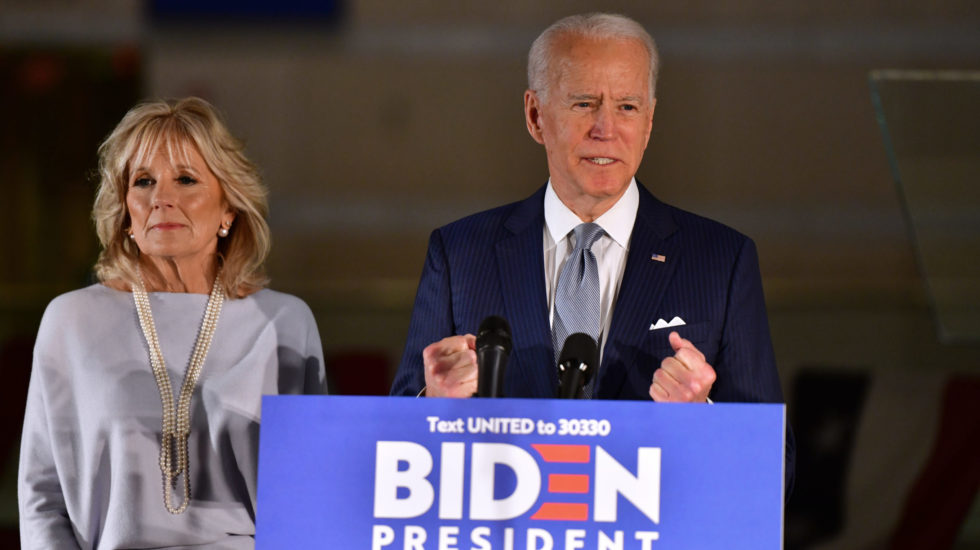Call it Super Tuesday Too — at least for Joe Biden, who now has a clear path to the Democratic nomination for president.
It was hardly a replay of the bonanza he gained one week earlier, on the Super Tuesday, when Biden gathered in nearly 450 delegates for the Democratic presidential nomination in dramatic fashion.
But the votes yesterday in five state primaries and one caucus added greatly to the 670 delegates the former vice president had going in, and stretched his lead over Bernie Sanders to [at least/more than] 150 delegates.
The exact delegate totals won’t be known for a day or two, but the nominee will need 1,991.
The voters’ verdict is likely to be handed down next week, when primaries are held in Florida, Ohio, Illinois and Arizona, with a total of 577 delegates on the line.
But it was telling that after Tuesday’s trend became clear, Biden came out to speak, while — uncharacteristically — Sanders did not, reportedly huddling with members of his campaign to decide what to do next.
Few, if any, expect Sanders might drop out before next Sunday’s debate with Biden, when he has an opportunity to either draw the party together behind the anticipated nominee, or continue forceful, finger-wagging upbraiding of his rival.
Biden appealed for party unity, saying to Sanders supporters “we need you, we want you” in a brief, happy but modest speech at the National Constitution Center in Philadelphia.
“I want to thank Bernie Sanders and his supporters for their tireless energy and their passion,” Biden said. “We share a common goal, and together, we’ll defeat Donald Trump.”
Biden blasted Donald Trump as a divisive and incompetent leader, particularly with regard to the still-expanding coronavirus crisis — and as a man undeserving of the office he holds.
“Tonight we are a step closer to restoring decency, dignity and honor to the White House,” Biden said. “At this moment, there’s so much fear in the country. There’s so much fear across the world. We need presidential leadership that’s honest, trustworthy, truthful and steady.”
Throughout the evening, Biden impressed by scoring big in suburban areas everywhere and performed far better with white working class voters than many observers expected.
The evening began with consecutive Biden victories in Mississippi and Missouri — where he dominated — and in Michigan, the biggest prize of the day.
Michigan, with 125 delegates at stake, turned out to be a major Biden win: 52.9% of the vote to Sanders’ 36.5% and 53 delegates to Sanders’ 35.
In Missouri and Mississippi, Biden’s support among African American voters was on vivid display. He collected more than 80% of the vote in Mississippi, where exit polls showed that two-thirds of those voting in the Democratic primary were black.
The focus then shifted west, to Washington state and neighboring Idaho.
It was neck-and-neck in Washington, where early voters (including supporters of candidates who later dropped out) accounted for a large portion of the total. Sanders and Biden wound up virtually tied at about 33% apiece, gaining 17 delegates each.
Biden did well in Idaho, beating Sanders by more than 7%. Biden received 9 delegates to Sanders’ 7.
In the North Dakota caucuses, Sanders won, taking 48% of the vote, yielding 5 delegates. Biden got 42% and 5 delegates.
As the evening went on and it became clear how well Biden was doing, CNN commentator and former presidential candidate Andrew Yang endorsed his former rival, live on the air.
“The math says Joe is our prohibitive nominee,” Yang said, adding that he had supported Sanders in 2016 and had been prepared to support whichever candidate emerged as the nominee.
Tuesday’s results also convinced other key Democratic players that Biden is assured of the nomination, including Priorities USA, a Super Pac whose chairman tweeted that — echoing Yang — “the math is now clear.”
Such support means more of exactly what Biden needs most at this point in the drive to unseat Donald Trump: money. Money for campaigning, money for advertising.



